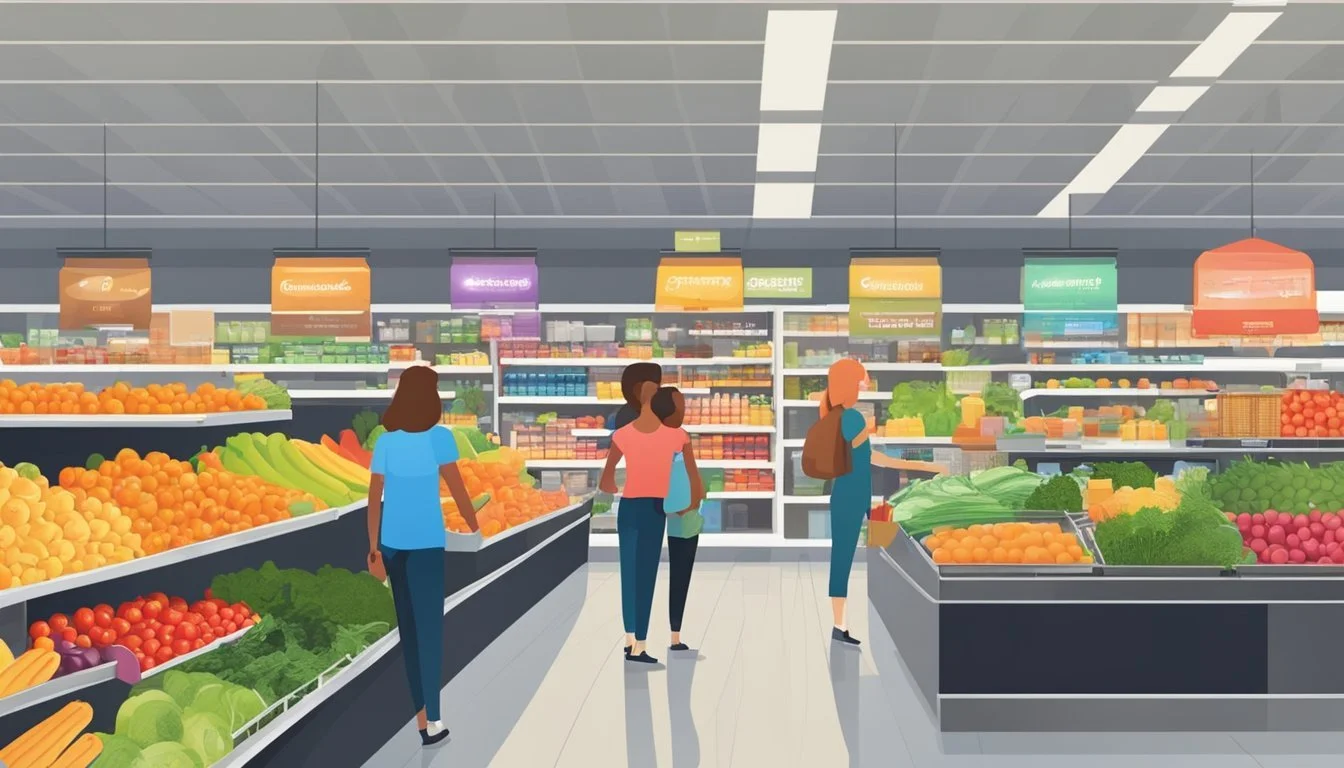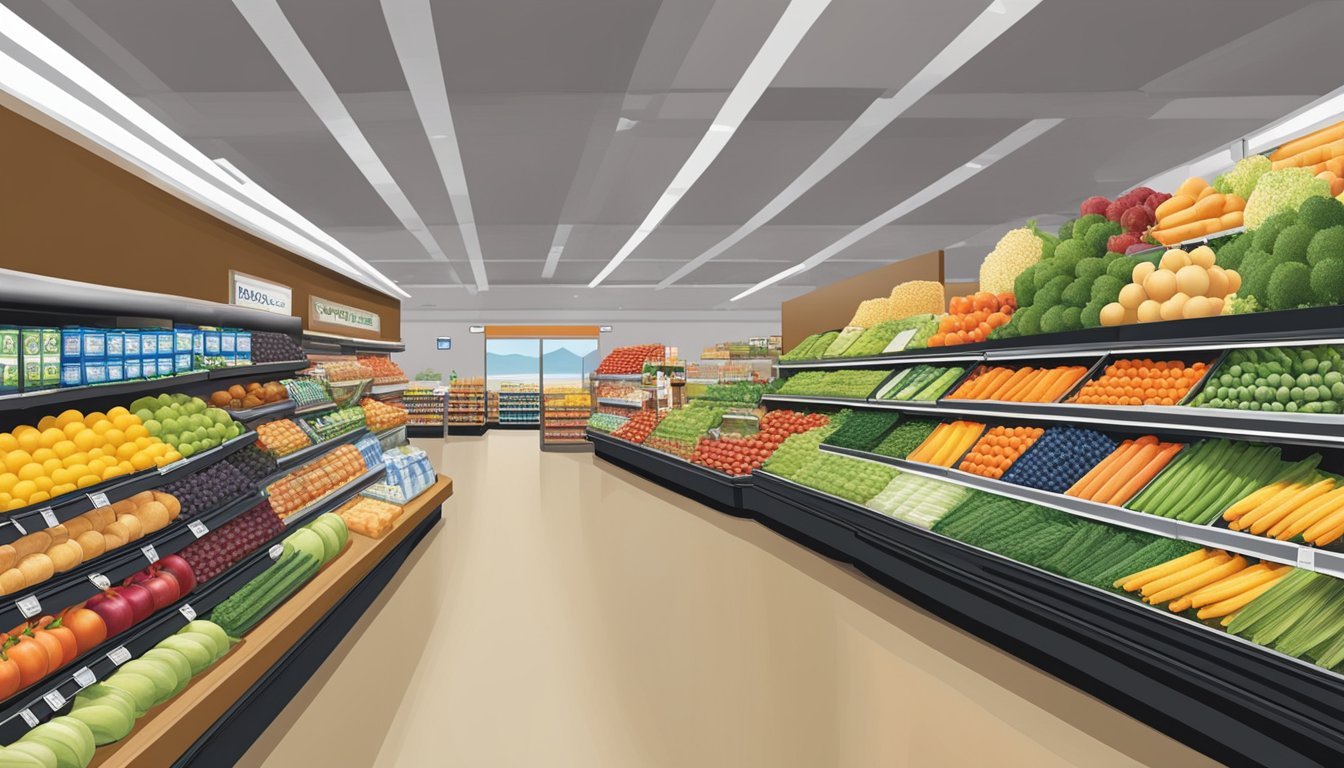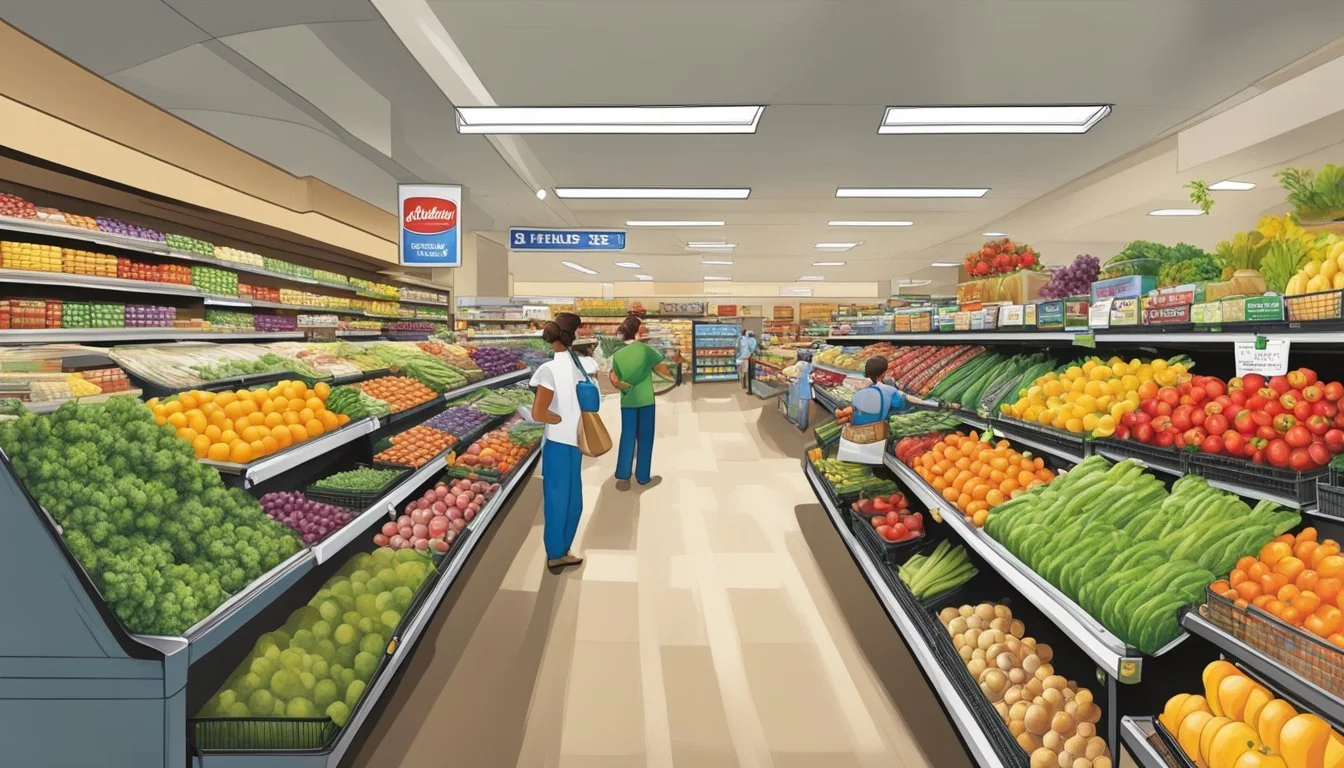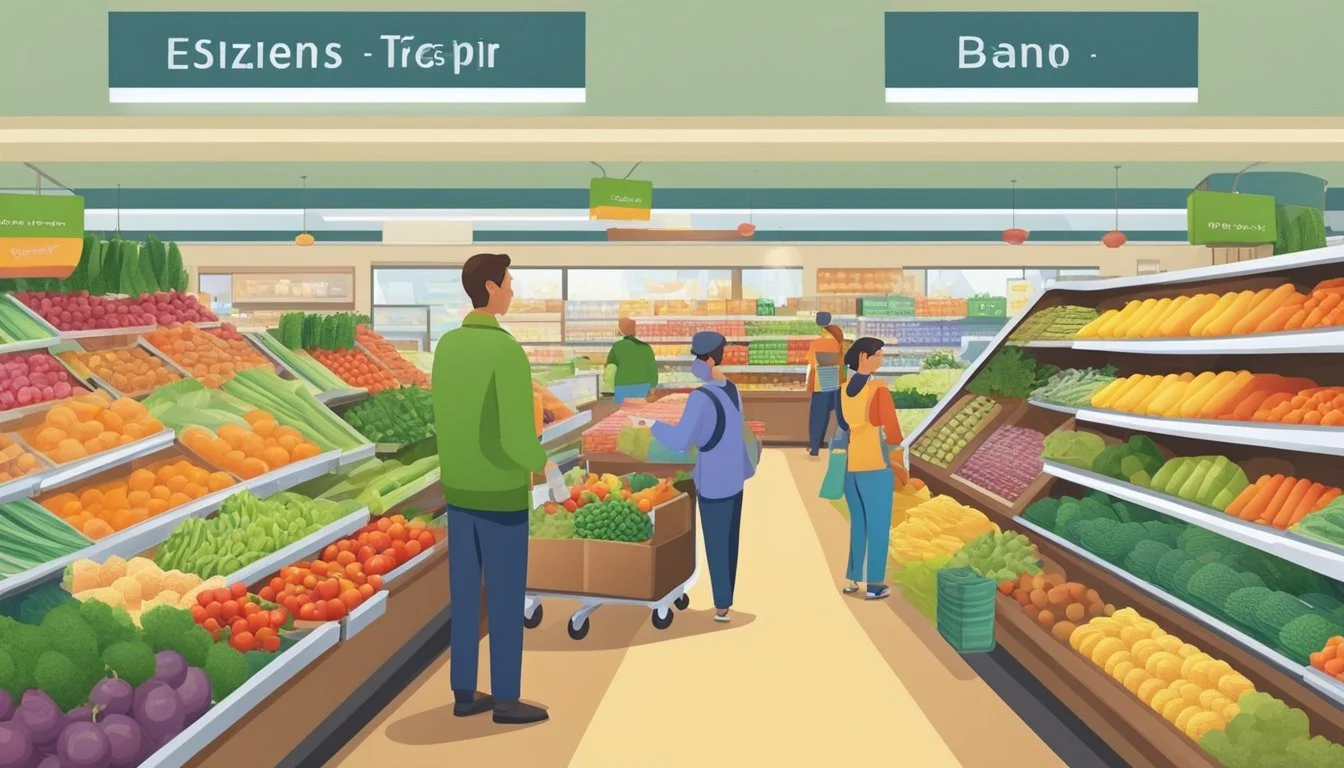Albertsons vs Raley's
A Comprehensive Comparison of Prices, Selection, and Service
Choosing the right grocery store can significantly impact your shopping experience and budget. Albertsons and Raley's are two popular supermarket chains that serve communities across the western United States. Both offer a wide range of products and services, but each has its own unique strengths and characteristics.
Albertsons generally provides more competitive prices and a broader selection of national brands, while Raley's focuses on higher-quality products and a more personalized shopping experience. Albertsons operates over 2,200 stores nationwide, giving it substantial buying power and the ability to offer frequent deals and discounts. Raley's, with its smaller footprint of around 130 stores, emphasizes fresh, local produce and a curated selection of specialty items.
The choice between Albertsons and Raley's often comes down to individual preferences and priorities. Shoppers seeking the lowest prices on everyday items may lean towards Albertsons, while those who prioritize quality and are willing to pay a bit more might prefer Raley's. Factors such as store locations, customer service, and specific product offerings can also influence which grocery store is the better choice for each consumer.
Company Profiles
Albertsons and Raley's are two prominent grocery store chains with rich histories and distinct market positions. Both have evolved significantly since their founding, expanding their reach and adapting to changing consumer needs.
Albertsons: From Founding to Present
Joe Albertson opened the first Albertsons store in Boise, Idaho in 1939. The store quickly gained popularity for its innovative offerings, including an in-store ice cream shop and one of the first magazine racks in a supermarket.
Albertsons grew rapidly through acquisitions and new store openings. In 2015, it merged with Safeway, creating one of the largest food and drug retailers in the United States.
The company now operates over 2,200 stores across 34 states under various banners. Albertsons has embraced technology, implementing digital initiatives like online ordering and delivery services.
Raley's: History and Evolution
Thomas P. Raley founded Raley's in Placerville, California in 1935. The company began as a single drive-in market and expanded steadily throughout Northern California and Nevada.
Raley's has remained family-owned for three generations. The chain is known for its focus on fresh, high-quality products and customer service.
In recent years, Raley's has emphasized health and wellness. The company launched its own line of better-for-you products and redesigned stores to highlight nutritious options.
Raley's operates approximately 130 stores under several banners, including Raley's, Bel Air Markets, and Nob Hill Foods. The company has also invested in e-commerce capabilities to meet changing consumer preferences.
Store Locations and Accessibility
Albertsons and Raley's differ significantly in their geographic reach and store density across various markets. Both chains aim to provide convenient options for consumers in their respective service areas.
Geographic Reach and Expansion
Albertsons operates on a much larger scale, with stores spread across 34 states and the District of Columbia. The chain has a strong presence in the Western United States, particularly in California, Washington, and Oregon. Albertsons also maintains a foothold in the Midwest, South, and Northeast regions.
Raley's has a more limited geographic footprint. The company primarily serves Northern California and Nevada. Raley's operates under several banners, including Raley's, Bel Air, Nob Hill Foods, and Raley's O-N-E Market. The chain has recently expanded its reach by acquiring Bashas' in Arizona, adding stores under the Bashas', Food City, and AJ's Fine Foods brands.
Store Density in Key Markets
In core markets, Albertsons often provides greater store density. Major metropolitan areas may have multiple Albertsons locations, offering consumers more choices within a smaller radius. This density can be particularly advantageous for urban shoppers seeking convenience.
Raley's tends to have a higher concentration of stores in specific regions of Northern California and Nevada. While the chain may have fewer total locations, it often maintains a strong presence in mid-sized cities and suburban areas within its operating territory. This focused approach allows Raley's to tailor its offerings to local preferences.
Both chains strategically place stores to serve their target demographics. Albertsons' wider reach means more consumers have access to their supermarkets across the country. Raley's more regionally-focused approach allows for deeper market penetration in its core areas.
Product Range and Quality
Albertsons and Raley's both offer extensive selections of groceries, but their product ranges and quality vary in key areas. Each store has its own strengths when it comes to fresh produce, meats, store brands, and organic options.
Fresh Produce Selection
Albertsons provides a wide array of fruits and vegetables, with a focus on seasonal offerings. Their produce section features both conventional and organic options. Shoppers can find pre-cut fruits and vegetables for convenience.
Raley's stands out with its emphasis on locally-sourced produce. The store partners with regional farmers to offer fresh, high-quality fruits and vegetables. Raley's produce department often includes unique and heirloom varieties not commonly found in other chains.
Both stores maintain strict quality control measures, but Raley's edge in local sourcing often results in fresher produce with a shorter farm-to-shelf time.
Meat and Butcher Quality
Albertsons offers a standard selection of meats, including beef, pork, and poultry. Their meat department provides both pre-packaged and butcher-cut options. The chain carries USDA Choice beef and occasionally offers Prime cuts.
Raley's excels in meat quality, with an emphasis on premium selections. Their butcher counters feature Prime beef, grass-fed options, and specialty cuts. Raley's also offers dry-aged beef for discerning customers.
Both stores provide fresh seafood, but Raley's often has a more extensive selection of wild-caught and sustainably sourced options.
Store Brand Offerings
Albertsons' primary store brand is "Signature Select," which covers a wide range of products from pantry staples to frozen foods. They also offer "O Organics" for organic items and "Open Nature" for natural products.
Raley's features its "Raley's" brand for many grocery items. They also have "Nob Hill Trading Co." for gourmet products and "Raley's Purely Made" for organic and natural offerings.
Both chains' store brands offer good value, but Raley's tends to focus more on premium quality in their private label products.
Organic and Sustainable Options
Albertsons has expanded its organic offerings in recent years. The "O Organics" line covers many product categories, from produce to dairy and packaged goods. They also carry various national organic brands.
Raley's puts a strong emphasis on organic and sustainable products. Their "Raley's Purely Made" line features organic, non-GMO, and minimally processed items. The store actively promotes environmentally friendly practices and offers a wide selection of eco-friendly household products.
Both chains provide clearly labeled organic sections, but Raley's generally offers a more extensive range of organic and sustainable options throughout the store.
Price Comparison
Albertsons and Raley's employ distinct pricing strategies to attract and retain customers. Their approaches to everyday pricing, discounts, and loyalty programs significantly impact shoppers' overall expenses.
Everyday Pricing Strategies
Albertsons generally offers competitive prices on a wide range of products. The store frequently uses a high-low pricing model, featuring regular sales and promotions on select items. This strategy allows customers to save on specific products each week.
Raley's, on the other hand, tends to maintain slightly higher everyday prices. The chain focuses on providing quality products and exceptional customer service, which can justify the price difference for some shoppers.
A 154-item list comparison between the two stores revealed that Albertsons often comes out ahead on common household items and groceries.
Discounts and Loyalty Programs
Both chains have robust loyalty programs to incentivize repeat customers. Albertsons' Just for U program offers personalized deals and digital coupons. Members can save on their favorite items and earn points for future discounts.
Raley's Something Extra rewards program provides similar benefits. It includes exclusive member pricing, digital coupons, and points that can be redeemed for store credit.
Albertsons frequently uses loss leaders - deeply discounted popular items - to draw customers into stores. Raley's relies less on this tactic, focusing instead on consistent pricing and quality.
Comparison with Competing Chains
When compared to other major grocery chains, Albertsons and Raley's fall in the mid-range for pricing. Walmart and warehouse clubs like Costco often beat both on price for bulk purchases.
Albertsons' prices are generally more competitive with discount chains. A recent study found Albertsons' prices to be about 10-15% lower than Raley's on average for a typical shopping basket.
Raley's prices are closer to those of upscale chains like Whole Foods. However, Raley's often beats these premium stores on price while maintaining a reputation for quality.
Amazon Prime discounts at Whole Foods have narrowed the gap somewhat, but Albertsons still maintains a price advantage for most shoppers.
Shopping Experience
The shopping experience at Albertsons and Raley's differs in several key areas. Customer service, store cleanliness, layout, and checkout efficiency all play crucial roles in shaping how shoppers perceive each supermarket.
In-Store Customer Service
Albertsons emphasizes personalized assistance. Staff members are trained to greet customers and offer help locating items. They often provide product recommendations and answer questions about promotions.
Raley's takes pride in its knowledgeable employees. The company invests in staff education, particularly in specialty departments like produce and deli. This expertise allows workers to offer detailed information about product origins and preparation methods.
Both chains have implemented customer feedback systems. Albertsons uses in-store kiosks for quick surveys, while Raley's encourages shoppers to participate in online questionnaires. These efforts help the stores continually improve their service.
Cleanliness and Store Layout
Albertsons focuses on wide aisles and clear signage. The stores typically feature a logical flow, with produce near the entrance and staples like bread and milk toward the back. This layout encourages customers to explore various departments.
Raley's puts emphasis on creating a welcoming atmosphere. Their stores often incorporate natural lighting and earthy color schemes. The layout tends to group complementary items together, making meal planning easier for shoppers.
Both chains prioritize cleanliness. Regular cleaning schedules ensure floors are spotless and shelves are well-maintained. Albertsons and Raley's have increased their sanitation efforts in recent years, with hand sanitizer stations and frequent disinfecting of high-touch areas.
Checkout Efficiency
Albertsons has invested in self-checkout technology. Many locations offer a mix of traditional lanes and self-service options, catering to different customer preferences. The chain also utilizes queue management systems during peak hours to reduce wait times.
Raley's takes pride in its personal touch at checkout. While they do offer self-checkout in some stores, they focus on staffing adequate numbers of cashiers. The company trains its employees to engage in friendly conversation while maintaining efficiency.
Both supermarkets have introduced mobile apps for faster checkout. Customers can scan items as they shop and pay through their smartphones, bypassing traditional lines altogether. This technology appeals particularly to tech-savvy shoppers and busy families looking to save time.
Consumer Convenience
Albertsons and Raley's offer various conveniences to enhance the shopping experience. Both chains prioritize customer satisfaction through online services and accessibility features at their physical locations.
Online Shopping and Delivery
Albertsons provides a robust e-commerce platform. Customers can order groceries online for home delivery or curbside pickup. The Albertsons app allows users to create shopping lists and access digital coupons.
Raley's also offers online ordering and delivery services. Their eCart program enables customers to shop online and pick up orders at designated store locations. Raley's Something Extra rewards program integrates with their online platform, providing personalized deals.
Both chains have expanded their delivery options in recent years. Albertsons partners with third-party services like Instacart in some areas. Raley's delivery service is available in select markets, with plans for expansion.
Parking and Store Accessibility
Albertsons stores typically feature large parking lots to accommodate shoppers. Many locations offer designated spots for curbside pickup customers. Inside, wide aisles and clear signage improve navigation.
Raley's designs its stores with customer comfort in mind. Parking areas are well-lit and include accessible spaces near entrances. Store layouts prioritize ease of movement, with strategically placed departments and checkout areas.
Both chains comply with ADA requirements. They provide motorized shopping carts and assistance for customers with mobility issues. Albertsons and Raley's train staff to offer personalized help when needed.
Brand Reputation and Customer Loyalty
Albertsons and Raley's have cultivated distinct brand identities and customer loyalty strategies in the competitive grocery market. Both chains prioritize building strong connections with shoppers through various initiatives and programs.
Public Perception and Brand Value
Albertsons has positioned itself as a nationwide grocer with a focus on convenience and value. The company operates multiple store brands, including Safeway and Vons, which helps broaden its appeal across different regions. Albertsons has invested in sustainability efforts and digital innovations to enhance its brand image.
Raley's, a smaller regional chain, has built a reputation for quality products and community involvement. The company emphasizes its family-owned roots and commitment to health and wellness. Raley's store brands often feature locally sourced and organic options, appealing to health-conscious consumers.
Both chains face competition from popular retailers like Trader Joe's, Costco, and Whole Foods Market. These competitors have strong brand loyalty and unique offerings that challenge traditional supermarkets.
Customer Loyalty and Retention
Albertsons' loyalty program has seen significant growth, with a 45% increase in enrollment over two years, reaching 30 million members. The company uses transactional data to segment customers and tailor offerings based on purchasing patterns and price sensitivity.
Raley's loyalty program focuses on personalized experiences and rewards. The company analyzes customer data to identify shopping habits and preferences, allowing for targeted promotions and product recommendations.
Both chains face challenges from regional grocers like H-E-B and Publix, known for their strong customer loyalty. Amazon's entry into the grocery market has also raised the bar for digital engagement and convenience.
Albertsons and Raley's continue to invest in omnichannel experiences, blending in-store and digital interactions to meet evolving customer expectations and strengthen loyalty in a competitive landscape.
Health and Safety Standards
Albertsons and Raley's prioritize customer well-being through rigorous health and safety measures. Both chains implement comprehensive food safety protocols and have policies regarding meat sourcing and animal welfare.
Food Safety Protocols
Albertsons maintains strict sanitation standards in all departments. Employees undergo regular food safety training and follow proper handwashing procedures. The company uses color-coded cutting boards to prevent cross-contamination between different food types.
Raley's emphasizes food safety through its "Farm to Fork" program. This initiative ensures traceability of products from source to store. The chain conducts frequent food safety audits and maintains temperature logs for perishable items.
Both stores use HACCP (Hazard Analysis Critical Control Points) systems to identify and prevent potential food safety risks. They also have recall procedures in place to quickly remove any potentially unsafe products from shelves.
Meat Sourcing and Animal Welfare
Albertsons offers a range of meat options, including organic and antibiotic-free choices. The company has committed to sourcing cage-free eggs and gestation crate-free pork by 2025.
Raley's "Purely Made" program features meat raised without antibiotics or added hormones. The chain partners with local ranchers who follow humane animal handling practices.
Both stores provide transparency about their meat sources. Albertsons labels country of origin on meat products. Raley's offers QR codes on packaging, allowing customers to trace meat back to the farm.
Neither chain uses growth hormones in their store-brand beef. Both have expanded their organic meat selections in recent years to meet growing consumer demand for these products.
Corporate Responsibility and Community Impact
Both Albertsons and Raley's demonstrate commitments to sustainability and community support. They have implemented various initiatives to reduce their environmental footprint and give back to local communities.
Sustainability Initiatives
Albertsons has set ambitious sustainability goals, aiming to reduce plastic waste and carbon emissions. The company plans to make 100% of its store-brand packaging recyclable, reusable, or compostable by 2025. Albertsons has also invested in energy-efficient technologies and renewable energy sources for its stores.
Raley's focuses on sustainable sourcing and reducing food waste. The company partners with local farmers to offer fresh, seasonal produce. Raley's has implemented a food recovery program, donating unsold edible food to local food banks and composting inedible food waste.
Both retailers have made efforts to offer more sustainable product choices. They have expanded their organic and locally-sourced offerings to meet growing consumer demand for environmentally-friendly options.
Charitable Programs and Community Support
Albertsons operates the Albertsons Companies Foundation, which supports causes like hunger relief, education, and health initiatives. The foundation has donated millions of dollars to local charities and food banks across the country.
Raley's runs the Food For Families program, providing food assistance to those in need. The company also supports youth development through its Extra Credit program, which allows customers to donate their change to local schools.
Both retailers organize regular volunteer events for employees to engage with their communities. They partner with local organizations to address specific needs in the areas they serve.
Albertsons and Raley's have implemented programs to support local suppliers and small businesses. This approach helps strengthen local economies and provides customers with unique, community-specific products.
Future Outlook
The grocery industry faces significant changes in the coming years. Both Albertsons and Raley's are positioning themselves to adapt and grow in a competitive landscape.
Industry Trends and Predictions
E-commerce is expected to return to growth after cooling off in 2022. Grocery chains are investing heavily in online ordering and delivery capabilities to meet consumer demand. Prepared foods continue to be a focus, with stores expanding their selections of ready-to-eat meals and meal kits.
Health and nutrition remain key priorities. Raley's has doubled down on this trend with its O-N-E Market concept, offering more organic and locally-sourced products. Albertsons is likely to follow suit, expanding its natural and organic offerings across stores.
Value retailing is gaining prominence as consumers become more price-sensitive. Discount chains like Walmart and Aldi are putting pressure on traditional supermarkets to keep prices competitive.
Expansion and Growth Plans
Albertsons has shown a willingness to grow through acquisitions. Its recent purchase of Raley's stores in New Mexico demonstrates its strategy to expand into new markets. The company now operates 28 stores in the state, with 8 in Albuquerque alone.
Raley's is focusing on targeted growth and store renovations. The chain's acquisition of Bashas' Family of Stores in Arizona signals its intent to expand regionally. Raley's is also investing in store upgrades, particularly in its produce and butcher departments.
Both chains face potential disruption from the proposed Kroger-Albertsons merger. If approved, this deal could reshape the competitive landscape and spur further consolidation in the industry.










